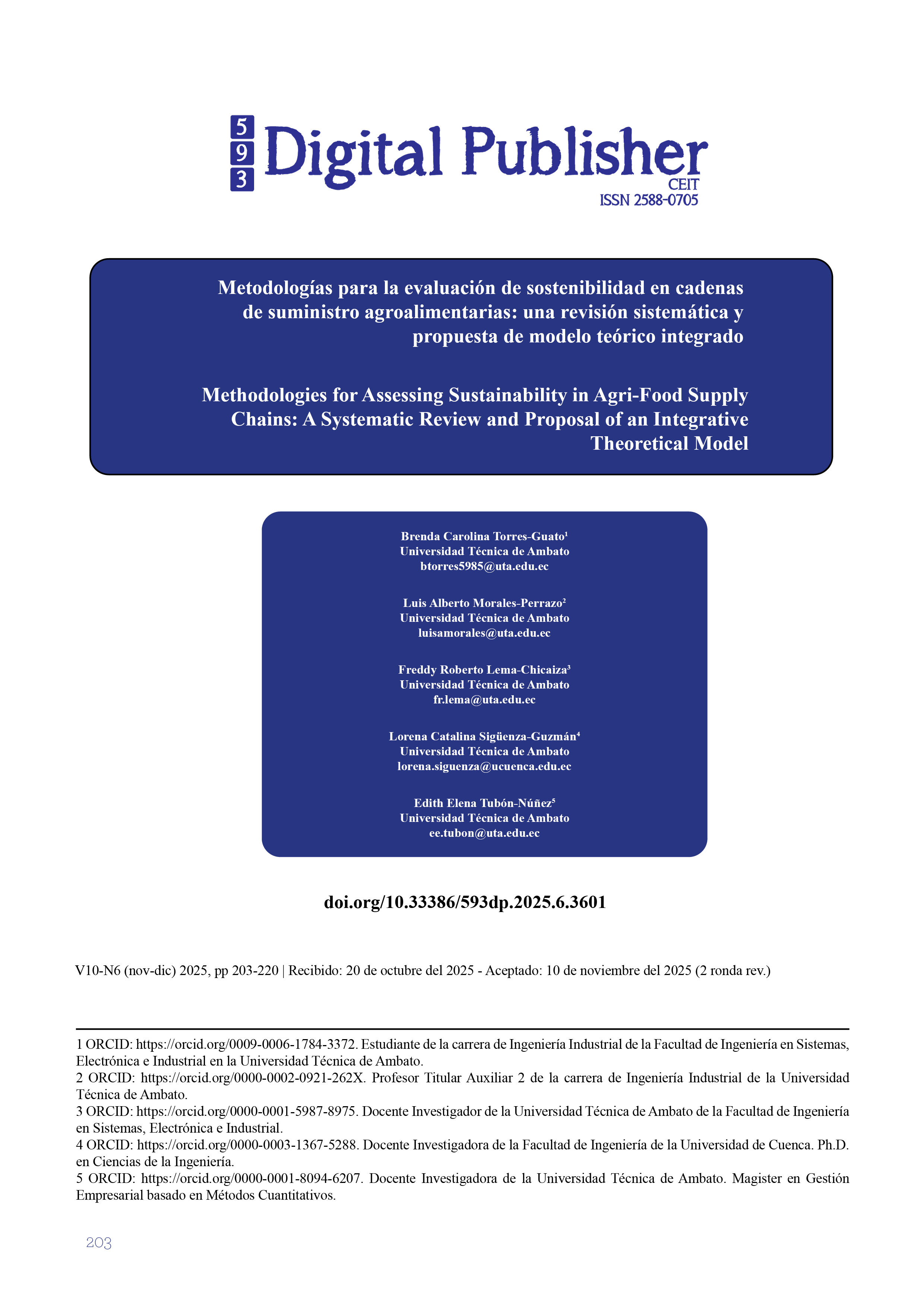Metodologías para la evaluación de sostenibilidad en cadenas de suministro agroalimentarias: una revisión sistemática y propuesta de modelo teórico integrado
Contenido principal del artículo
Resumen
El sector agroalimentario aporta hasta el 40 % del empleo y más de un tercio del PIB en países como México y España; sin embargo, sus impactos ambientales podrían aumentar entre un 50% y 90% hacia 2050. Ante esta proyección, este estudio realizó una revisión sistemática PRISMA-PIO que sintetiza 59 estudios publicados entre 2020 y 2025 en Springer Link, Scopus y Science Direct, con el objetivo de construir un modelo teórico que articule eslabones, dimensiones y metodologías de sostenibilidad en cadenas de suministro agroalimentarias. Los resultados evidencian que los eslabones de producción, procesamiento y distribución concentran la mayor atención en la literatura. La dimensión de sostenibilidad más abordada corresponde al Triple Bottom Line (TBL: ambiental, económica y social). Metodológicamente, el ACV, LCC y S-LCA son las principales metodologías para cada dimensión, complementadas por otras metodologías integradoras como SAFA/RISE/IDEA. Las tecnologías emergentes identificadas incluyen Big-Data, IoT, Blockchain y gemelos digitales para cerrar brechas de datos y trazabilidad. El modelo teórico propuesto integra estos componentes y supera el abordaje fragmentado de investigaciones previas mediante la articulación sistemática de elementos que tradicionalmente se estudian de manera aislada, proporcionando un marco holístico y adaptable que permite a las organizaciones diseñar estrategias de sostenibilidad alineadas con sus objetivos específicos.
Descargas
Detalles del artículo

Esta obra está bajo una licencia internacional Creative Commons Atribución-NoComercial-CompartirIgual 4.0.
1. Derechos de autor
Las obras que se publican en 593 Digital Publisher CEIT están sujetas a los siguientes términos:
1.1. 593 Digital Publisher CEIT, conserva los derechos patrimoniales (copyright) de las obras publicadas, favorece y permite la reutilización de las mismas bajo la licencia Licencia Creative Commons 4.0 de Reconocimiento-NoComercial-CompartirIgual 4.0, por lo cual se pueden copiar, usar, difundir, transmitir y exponer públicamente, siempre que:
1.1.a. Se cite la autoría y fuente original de su publicación (revista, editorial, URL).
1.1.b. No se usen para fines comerciales u onerosos.
1.1.c. Se mencione la existencia y especificaciones de esta licencia de uso.
Citas
Allali, T., Colabianchi, M., Moretti, M., & Brunori, G. (2024). Towards a new framework to assess agri-food value chains’ sustainability – The case of chestnut value chain. Heliyon, 10(7). https://doi.org/10.1016/j.heliyon.2024.e27836
Almelhem, M., Buics, L., & Süle, E. (2025). Comparison of sustainability and circularity indicators: downstream vs. upstream supply chain strategies. Discover Sustainability, 6(1). https://doi.org/10.1007/s43621-025-01158-0
Alonso-Adame, A., Van Meensel, J., Marchand, F., Van Passel, S., & Farahbakhsh, S. (2024). Sustainability transitions in agri-food systems through the lens of agent-based modeling: A systematic review. Sustainability Science, 19(6), 2101–2118. https://doi.org/10.1007/s11625-024-01551-0
Amamou, A., Chabouh, S., Sidhom, L., Zouari, A., & Mami, A. (2025). Agri-Food Supply Chain Sustainability Indicators from a Multi-Capital Perspective: A Systematic Review. Sustainability (Switzerland), 17(9). https://doi.org/10.3390/su17094174
Amaruzaman, S., Bardsley, D. K., & Stringer, R. (2023). Analysing agricultural policy outcomes in the uplands of Indonesia: A multi-dimensional sustainability assessment. Sustainable Development, 31(3), 1937–1950. https://doi.org/10.1002/sd.2494
Andika, A., Perdana, T., Chaerani, D., & Utomo, D. S. (2025). Transitioning towards zero waste in the agri-food supply chain: A review of sustainable circular agri-food supply chain. Sustainable Futures, 10. https://doi.org/10.1016/j.sftr.2025.100917
Arimany-Serrat, N., Montanyà, O., & Amat, O. (2024). Sustainability as a resilience factor in the agri-food supply chain. Sustainability (Switzerland), 16(16). https://doi.org/10.3390/su16167162
Basenach, L., Renneberg, B., Salbach, H., Dreier, M., & Wölfling, K. (2023). Systematic reviews and meta-analyses of treatment interventions for Internet use disorders: Critical analysis of the methodical quality according to the PRISMA guidelines. Journal of Behavioral Addictions, 12. https://doi.org/10.1556/2006.2022.00087
Calvillo-Arriola, A. E., & Sotelo-Navarro, P. X. (2024). A step towards sustainability: life cycle assessment of coffee produced in the indigenous community of Ocotepec, Chiapas, Mexico. Discover Sustainability, 5(1). https://doi.org/10.1007/s43621-024-00194-6
Castillo-Díaz, F. J., Belmonte-Ureña, L. J., López-Serrano, M. J., & Camacho-Ferre, F. (2024). Quantifying sustainability in the agri-food system: a comprehensive methodological framework and expert consensus approach. Agricultural and Food Economics, 12(1). https://doi.org/10.1186/s40100-024-00314-w
Dergan, T., Ivanovska, A., Kocjančič, T., Iannetta, P. P. M., & Debeljak, M. (2022). Multi-SWOT multi-stakeholder-based sustainability assessment methodology: Applied to improve Slovenian legume-based agri-food chains. Sustainability (Switzerland), 14. https://doi.org/10.3390/su142215374
D’Eusanio, M., & Petti, L. (2024). Blockchain technology and Social Life Cycle Assessment: synergies and implications. International Journal of Life Cycle Assessment. https://doi.org/10.1007/s11367-024-02338-2
Digiesi, S., Facchini, F., & Silvestri, B. (2022). Green strategies to reduce the environmental impact of jam production. Transportation Research Procedia, 67, 72–82. https://doi.org/10.1016/j.trpro.2022.12.037
Doernberg, A., Piorr, A., Zasada, I., Wascher, D., & Schmutz, U. (2022). Sustainability assessment of short food supply chains (SFSC): Developing and testing a rapid assessment tool in one African and three European city regions. Agriculture and Human Values, 39(3), 885–904. https://doi.org/10.1007/s10460-021-10288-w
Dominguez Aldama, D., Grassauer, F., Zhu, Y., Ardestani-Jaafari, A., & Pelletier, N. (2023). Allocation methods in life cycle assessments (LCAs) of agri-food co-products and food waste valorization systems: Systematic review and recommendations. Journal of Cleaner Production, 421. https://doi.org/10.1016/j.jclepro.2023.138488
Egas, D., Azarkamand, S., Casals, C., Ponsá, S., Llenas, L., & Colón, J. (2023). Life cycle assessment of bio-based fertilizers production systems: Where are we and where should we be heading? International Journal of Life Cycle Assessment, 28(6), 626–650. https://doi.org/10.1007/s11367-023-02168-8
Elkoraichi, Y., Elfezazi, S., & Belhadi, A. (2025). Analysis of barriers to blockchain technology adoption in the African agri-food supply chain. Discover Sustainability, 6(1). https://doi.org/10.1007/s43621-025-01125-9
Falcone, G., Fazari, A., Vono, G., Gulisano, G., & Strano, A. (2024). Application of the LCA approach to the citrus production chain – A systematic review. Cleaner Environmental Systems, 12. https://doi.org/10.1016/j.cesys.2023.100156
Ferdous, J., Bensebaa, F., & Pelletier, N. (2023). Integration of LCA, TEA, Process Simulation and Optimization: A systematic review of current practices and scope to propose a framework for pulse processing pathways. Journal of Cleaner Production, 402. https://doi.org/10.1016/j.jclepro.2023.136804
Gómez-Garza, R., Güereca, L. P., Padilla-Rivera, A., & Ibarra, A. A. (2024). Barriers and enablers of life cycle assessment in small and medium enterprises: a systematic review. Environment, Development and Sustainability. https://doi.org/10.1007/s10668-024-05622-1
Gusenbauer, M., & Gauster, S. (2025). How to search for literature in systematic reviews and meta-analyses: A comprehensive step-by-step guide. Technological Forecasting and Social Change, 212. https://doi.org/10.1016/j.techfore.2024.123833
Hassoun, A. (2025). Food sustainability 4.0: harnessing fourth industrial revolution technologies for sustainable food systems. Discover Food, 5(1). https://doi.org/10.1007/s44187-025-00461-z
Heinzova, R., Vichova, K., Peterek, K., & Strohmandl, J. (2022). Supply chain risk management in Dairy Industry of the Czech Republic. Acta Logística, 9(4), 441–448. https://doi.org/10.22306/al.v9i4.343
Kamariotou, M., Kitsios, F., Charatsari, C., Lioutas, E. D., & Talias, M. A. (2022). Digital strategy decision support systems: Agrifood supply chain management in SMEs. Sensors, 22. https://doi.org/10.3390/s22010274
Kersten, C., Kerber, J., Silva, J., Bouzon, M., & Campos, L. (2024). Traceability in the agri-food supply chain: a new perspective under the Circular Economy approach. Production, 34. https://doi.org/10.1590/0103-6513.20240009
Khokhar, M., Thaheem, I., Alam, F., Khaliq, N., Sharma, A., & Duan, Y. (2025). An analytical approach to blockchain technology influence on sustainable supply chain. Sustainable Futures, 10. https://doi.org/10.1016/j.sftr.2025.100898
Kowalska, A., Grobelak, A., Kacprzak, M., & Lyng, K. A. (2021). Methods and tools for environmental technologies risk evaluation: The principal guidelines—a review. International Journal of Environmental Science and Technology, 18(6), 1683–1694. https://doi.org/10.1007/s13762-020-02979-4
López-Santos, Y., Sánchez-Partida, D., & Cano-Olivos, P. (2020). Strategic model to assess the sustainability and competitiveness of focal agri-food Smes and their supply chains: A vision beyond COVID 19. Advances in Science, Technology and Engineering Systems, 5, 1214–1224. https://doi.org/10.25046/aj0505147
Moreno-Miranda, C., & Dries, L. (2022). Integrating coordination mechanisms in the sustainability assessment of agri-food chains: From a structured literature review to a comprehensive framework. Ecological Economics, 192. https://doi.org/10.1016/j.ecolecon.2021.107265
Mwangi, G. M., Despoudi, S., Espindola, O. R., Spanaki, K., & Papadopoulos, T. (2021). A planetary boundaries perspective on the sustainability: resilience relationship in the Kenyan tea supply chain. Annals of Operations Research, 319(1), 661–695. https://doi.org/10.1007/s10479-021-04096-y
Myshko, A., Checchinato, F., Colapinto, C., Finotto, V., & Mauracher, C. (2024). Towards the twin transition in the agri-food sector? Framing the current debate on sustainability and digitalisation. Journal of Cleaner Production, 452. https://doi.org/10.1016/j.jclepro.2024.142063
Navarro-del Aguila, I., & Burgos-Jiménez, J. (2022). Sustainable Innovation through Developing Hybrid Agri-Food Supply Chains: A Case in South-Eastern Spain. Toxics, 10(12). https://doi.org/10.3390/toxics10120752
Notarnicola, B., Tassielli, G., Renzulli, P. A., Di Capua, R., Saija, G., Salomone, R., Primerano, P., Petti, L., Raggi, A., Casolani, N., Strano, A., & Mistretta, M. (2022). Life cycle inventory data for the Italian agri-food sector: background, sources and methodological aspects. International Journal of Life Cycle Assessment, 29(8), 1430–1445. https://doi.org/10.1007/s11367-021-02020-x
Orou Sannou, R., Kirschke, S., & Günther, E. (2023). Integrating the social perspective into the sustainability assessment of agri-food systems: A review of indicators. Sustainable Production and Consumption, 39, 175–190. https://doi.org/10.1016/j.spc.2023.05.014
Page, M., McKenzie, J., Bossuyt, P., Boutron, I., Hoffmann, T., Mulrow, C., Shamseer, L., Tetzlaff, J., Akl, E., Brennan, S., Chou, R., Glanville, J., Grimshaw, J., Hróbjartsson, A., Lalu, M., Li, T., Loder, E., Mayo-Wilson, E., McDonald, S., … Moher, D. (2021). The PRISMA 2020 statement: An updated guideline for reporting systematic reviews. BMJ, 372. https://doi.org/10.1136/bmj.n71
Qahtan, S., Alsattar, H. A., Zaidan, A. A., Deveci, M., Pamucar, D., Delen, D., & Pedrycz, W. (2023). Evaluation of agriculture-food 4.0 supply chain approaches using Fermatean probabilistic hesitant-fuzzy sets based decision making model. Applied Soft Computing, 138. https://doi.org/10.1016/j.asoc.2023.110170
Raimbekov, Z., Syzdykbayeva, B., Rakhmetulina, A., Rakhmetulina, Z., Abylaikhanova, T., Ordabayeva, M., & Doltes, L. (2023). The impact of agri-food supply channels on the efficiency and links in supply chains. Economies, 11(8). https://doi.org/10.3390/economies11080206
Reina-Usuga, L., Parra-López, C., Haro-Giménez, T., & Carmona-Torres, C. (2023). Sustainability assessment of Territorial Short Food Supply Chains versus Large‐Scale Food Distribution: The case of Colombia and Spain. Land Use Policy, 126. https://doi.org/10.1016/j.landusepol.2022.106529
Safeie-Noghlbari, B., Amiri, Z., Allahyari, M. S., Nikkhah, A., Ben Hassen, T., & Bacenetti, J. (2025). Social life cycle assessment of the olive oil industry: a case study in Guilan Province, Iran. Environment, Development and Sustainability, 27(6), 14553–14599. https://doi.org/10.1007/s10668-024-04463-2
Sánchez-Martín, M., Pedreño Plana, M., Ponce Gea, A. I., & Navarro-Mateu, F. (2023). And, at first, it was the research question… The PICO, PECO, SPIDER and FINER formats. Espiral. Cuadernos Del Profesorado, 16(32), 126–136. https://doi.org/10.25115/ecp.v16i32.9102
Scuderi, A., Chinnici, G., Zarbà, C., Cammarata, M., & Gravagno, R. M. (2025). Sustainability assessment of blood orange production in sicily through the application of the SAFA framework. Cleaner Environmental Systems, 18. https://doi.org/10.1016/j.cesys.2025.100293
Sharifmousavi, M., Kayvanfar, V., & Baldacci, R. (2024). Distributed artificial intelligence application in agri-food supply chains 4.0. Procedia Computer Science, 232, 211–220. https://doi.org/10.1016/j.procs.2024.01.021
Silvestri, R., Carloni, E., Morrone, D., & Santovito, S. (2025). The role of blockchain technology in supply chain relationships: Balancing efficiency and relational dynamics. Journal of Purchasing and Supply Management, 31(1). https://doi.org/10.1016/j.pursup.2024.100967
Souza Barbosa, A., Silva, M. C. B. C., Silva, L. B., Morioka, S. N., & Souza, V. F. (2023). Integration of Environmental, Social, and Governance (ESG) criteria: their impacts on corporate sustainability performance. Humanities and Social Sciences Communications, 10(1). https://doi.org/10.1057/s41599-023-01919-0
Torquati, B., Cecchini, L., Paffarini, C., & Chiorri, M. (2021). The economic and environmental sustainability of extra virgin olive oil supply chains: An analysis based on food miles and value chains. Economia Agro-Alimentare-Food Economy, 23(1), 1–28. https://doi.org/10.3280/ECAG1-2021OA11391
Tyagi, K. (2023). A global blockchain-based agro-food value chain to facilitate trade and sustainable blocks of healthy lives and food for all. Humanities and Social Sciences Communications, 10(1). https://doi.org/10.1057/s41599-023-01658-2
Veloso, V., Santos, A., Carvalho, A., & Barbosa-Póvoa, A. (2025). A comprehensive framework for assessing circular economy strategies in agri-food supply chains. Environment, Development and Sustainability. https://doi.org/10.1007/s10668-024-05755-3
Vicario-Modroño, V., Gallardo-Cobos, R., & Sánchez-Zamora, P. (2023). Sustainability evaluation of olive oil mills in Andalusia (Spain): a study based on composite indicators. Environment, Development and Sustainability, 25(7), 6363–6392. https://doi.org/10.1007/s10668-022-02307-5
Voglhuber-Slavinsky, A., Zicari, A., Smetana, S., Moller, B., Dönitz, E., Vranken, L., Zdravkovic, M., Aganovic, K., & Bahrs, E. (2022). Setting life cycle assessment (LCA) in a future-oriented context: the combination of qualitative scenarios and LCA in the agri-food sector. European Journal of Futures Research, 10(1). https://doi.org/10.1186/s40309-022-00203-9
Vono, G., Falcone, G., Mistretta, M., Fazari, A., & Strano, A. (2023). Life Cycle Inventory of the Italian citrus fruit supply chain: Modelling the agricultural phase inventory through statistical data processing. Cleaner Environmental Systems, 10. https://doi.org/10.1016/j.cesys.2023.100131
Wang, M., Kumar, V., Ruan, X., Saad, M., Garza-Reyes, J. A., & Kumar, A. (2022). Sustainability concerns on consumers’ attitude towards short food supply chains: an empirical investigation. Operations Management Research, 15(1–2), 76–92. https://doi.org/10.1007/s12063-021-00188-x
Winkelmann, S., Guennoun, R., Möller, F., Schoormann, T., & van der Valk, H. (2024). Back to a resilient future: Digital technologies for a sustainable supply chain. Information Systems and E-Business Management, 22(2), 315–350. https://doi.org/10.1007/s10257-024-00677-z
Wright, D. R., Bekessy, S. A., Lentini, P. E., Garrard, G. E., Gordon, A., Rodewald, A. D., Bennett, R. E., & Selinske, M. J. (2024). Sustainable coffee: A review of the diverse initiatives and governance dimensions of global coffee supply chains. Ambio, 53. https://doi.org/10.1007/s13280-024-02003-w
Zarbà, C., Gravagno, R. M., Chinnici, G., & Scuderi, A. (2025). A systematic review of the SAFA framework in the literature: An approach to assess sustainability in agri-food systems. Cleaner Environmental Systems, 16. https://doi.org/10.1016/j.cesys.2025.100267
Zhao, G., Chen, X., Jones, P., Liu, S., Lopez, C., Leoni, L., & Dennehy, D. (2024). Understanding the drivers of industry 4.0 technologies to enhance supply chain sustainability: Insights from the agri-food industry. Information Systems Frontiers, 27. https://doi.org/10.1007/s10796-024-10539-1






